SFA University
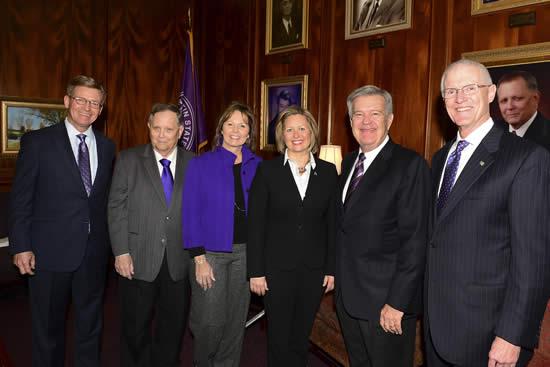
February 19, 2018 - Two Stephen F. Austin State University alumni, Karen Gantt of McKinney and Tom Mason of Dallas, recently participated in their first official meetings as members of the SFA Board of Regents. Brigettee Henderson of Lufkin and Ken Schaefer of Brownsville, who recently completed six-year terms on the board, were reappointed by Gov. Greg Abbott to continue their service to the university.
Gantt is an attorney and partner at the law offices of McCraw Gantt. She is a member of the State Bar of Texas and the College of the State Bar of Texas, which recognizes lawyers, paralegals and judges who maintain and enhance their skills through significant voluntary participation in legal education. She is a former member of the SFA Alumni Foundation Board of Governors and a past president of SFA’s Alumni Association.
Gantt graduated summa cum laude from SFA with a Bachelor of Arts in political science and was the highest-ranking graduate in her class. She earned a Juris Doctor degree from The University of Texas School of Law, where she was associate editor of The Review of Litigation.
Mason serves as executive vice president and chief financial officer of Hillwood Development, one of the top industrial, commercial and residential real estate developers in the country. He served in the U.S. Army Reserves and received a Bachelor of Science in math and general business from SFA. He is a certified public accountant and serves on the board of the Caruth Village Homeowners Association and is an officer of the Land-Hyland Scholarship Fund.
While attending SFA, Mason was a member of Phi Delta Theta social fraternity, sophomore class vice president, chairman of Greek Week activities, and was elected to Who’s Who Among American Colleges and Universities.
Gantt, Henderson and Mason were appointed to six-year terms. In addition to her reappointment as an SFA regent, Henderson was elected by board members during their meeting to serve as chair of the board. Her term as chair will begin April 24, 2018.
Henderson holds bachelor’s degrees in interior design and communication from SFA and is an independent consulting interior designer and executive assistant at Carnes and Co. Auctioneers. She is secretary of the Angelina Arts Alliance Board of Directors, a member of the Buckner Family Place board of directors, Buckner Family Services Circle of Angels and Junior League of Lufkin Sustainers.
A past board member of the Lufkin Salvation Army, Museum of East Texas and Angelina Beautiful Clean, Henderson is a former chair of the American Cancer Society’s Cattle Baron’s Gala in Angelina County and is past president of the Junior League of Lufkin.
Reappointed to fill the term of the late Barry Nelson, who passed away in November 2016, Schaefer will serve on the board through 2019.
A 1970 graduate of SFA with a Bachelor of Business Administration in economics, Schaefer is owner and president of Schaefer Stevedoring Company, which provides shipping services within the maritime and port logistics industries of the U.S. and Mexico. He is director of the West Gulf Maritime Association and a past board member of the University of Texas Pan American, Texas Commerce Bank, Fondo de Inversion de Veracruz, and Almacenadora Regional del Golfo.
During his first term as regent, Schaefer served as vice chair of the board and as chair of the building and grounds committee and the finance and audit committee.
For more information about the SFA Board of Regents, visit www.sfasu.edu/regents.
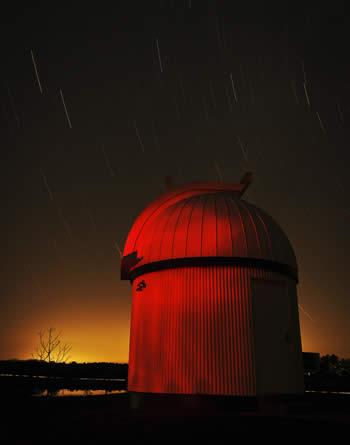
February 14, 2018 - The Stephen F. Austin State University Observatory will host its next public viewing session 7 p.m. Saturday, Feb. 24, weather permitting, giving visitors the opportunity to see the night sky like they have never seen it before.
Opening its doors to the public periodically throughout the year, the observatory is home to over 15 telescopes, including one formerly used by NASA.
The sessions offer visitors “an opportunity to do what they can’t do at home, and that is see the nighttime sky,” said Dr. Norman Markworth, professor in the Department of Physics, Engineering, and Astronomy and director of the SFA Observatory.
Visitors will have the chance to view the facility’s 41- and 18-inch telescopes and can utilize 8-inch telescopes set up for public use.
Students from the SFA chapter of the Society of Physics Students will assist with use of the telescopes, while visitors receive a quick lesson in sky lore and view constellations and star groups.
Housed 11 miles north of Nacogdoches, the observatory was built in the mid-1970s and has aided in various research efforts. Among its equipment, the observatory boasts an 18-inch telescope originally used by NASA on the Marshall Islands in the 1960s to help find landing sites on the moon.
“The story I heard was NASA wasn’t going to pay to have it shipped back to the U.S.,” Markworth said. “They were going to throw it in the ocean. I don’t know what happened, but they were finally convinced to ship the telescope back, and it lives here now.”
Today, the telescope is primarily used for asteroid hunting, Markworth said. The department also has a 41-inch telescope, built by Markworth and the department, used predominately for variable star research, a 16-inch telescope in a roll-off roof observatory and several other telescopes.
The observatory is used for educational purposes, giving students a place to conduct research and hosting astronomy students several times a week.
“It’s my philosophy that we do what students want done,” Markworth said. “If they want to work on projects, we’ll see that we can do it.”
While the observatory is primarily used for research, viewing sessions are held throughout the year to give the public an opportunity to see what they might not be able to see at home.
“I think humans have always had a curiosity for what that stuff is up there,” Markworth said, “and the more prevalent technology is, the less people actually want to know about stuff in the sky. But if you tell them, they’re really curious. They want to know more.”
The event is free and open to students and visitors of all ages. For large group accommodations, email astro@sfasu.edu.
By Joanna Armstrong, senior marketing communications specialist at Stephen F. Austin State University
February 12, 2018 Nacogdoches — Stephen F. Austin State University’s School of Human Sciences has launched a new degree program that allows students to earn a four-year degree completely online.
The program, which became available to SFA students in fall 2017, offers an entirely online Bachelor of Science in human sciences with an emphasis in human development and family studies. All core and elective courses are available online.
Dr. Rachel Jumper, assistant professor in SFA’s School of Human Sciences, said the online delivery allows students to earn a bachelor’s degree from a four-year university while working full time and living anywhere.
“We are meeting students ‘where they are’ rather than requiring them to come to us. They have access to the same faculty members, courses and university resources while not having to uproot their lives,” Jumper said. “While the human development and family studies degree has been an online completer program for several years, going fully online allows even more students to become Lumberjacks immediately rather than having to transfer from another school.”
Drs. Lynda Martin, director of the School of Human Sciences, and Hyunsook Kang, assistant professor, agree the online delivery method benefits both the students and university.
“We want to attract more students from diverse populations, which may enhance our quality of education,” Kang said. “An online program’s flexibility and convenience may increase our enrollment.”
With this degree, students learn to become “caretakers for our society,” Jumper said. Students learn to understand the growth, change and development of children, adults and the family while integrating a lifespan, multi-contextual and family systems approach.
Upon graduation, students have a variety of career options, including becoming early intervention specialists, lobbyists, directors of child care and senior citizen facilities, Head Start teachers, parent educators, camp directors and more.
“We are passionate about educating individuals regarding families and lifespan development,” Martin said. “By making this information available online, our reach is much greater, and the theory and research can be shared with more individuals.”
For more information about the program, visit sfaonline.info/human-development-and-family-studies.
By Kasi Dickerson, senior marketing communications specialist at Stephen F. Austin State University.
February 12, 2018 Nacogdoches – There’s a line in the show: “ … the best camouflage of all, in my opinion, is the plain and simple truth. Because nobody ever believes it.”
 Dr. Richard Jones had long forgotten that line in Max Frisch’s play “(Biedermann and) The Firebugs,” but he remembered this theme from when he first read the play more than 30 years ago.
Dr. Richard Jones had long forgotten that line in Max Frisch’s play “(Biedermann and) The Firebugs,” but he remembered this theme from when he first read the play more than 30 years ago.
“I was thinking about some specific episodes in my own life, but especially about the political climate today,” he said. “Ultimately, I was intrigued by the fact that the major surprise in this play is that there are no surprises in this play.”
Jones, professor of theatre at Stephen F. Austin State University, will direct “(Biedermann and) The Firebugs” when the School of Theatre presents it as part of this year’s Mainstage Series.
According to Jones, businessman Gottlieb Biedermann opens the play muttering about how arsonists (“firebugs”) have had so little trouble finagling their way into people’s houses, only to burn them down. And then the doorbell rings…
“Really, everyone knows what’s going to happen within the first 10 minutes,” he explains. “The play is not so much about where we’re going as how we get there.”
The play was originally written as a response to Nazism/Fascism, Jones explained.
“It comes from a moment in time when absurdism took on a political element and, in this case, overlapped with the more overtly political form of epic theatre,” he said. “Playwright Max Frisch was not infrequently accused of Communist sympathies. Certainly his politics leaned a little to the left, but he was really more anti-Nazi than pro-Marxist.”
The play presents its share of challenging moments for a director, Jones said, one of which is that it moves in and out of presentational vs. representational style.
“That is, there are moments when the characters explicitly acknowledge the audience, and moments when the actors pretend not to notice the audience at all,” he said. “It’s also a very funny play, but if it lapses too far into farce, the themes of ethical behavior, moral courage and critical thinking are subordinated.”
Jones said another challenge is the number of new theatre students the play will feature in its cast.
“It’s always a challenge to work with new people,” he said. “I’ve previously directed only two of the 13 actors in this play, and over half the cast wasn’t at SFA a year ago. The newcomers are all great to work with, but it inevitably takes a little more time for them to know what to expect from me, and for me to figure out how help them do their best work.”
Student actors will learn from the mix of styles in the play, and from the many lines (more than usual, according to Jones) that can be interpreted in fundamentally different ways.
“That’s especially challenging, because the temptation is to split the difference, and we end up losing the sense of the moment altogether,” Jones said.
Jones hopes the audience will appreciate and enjoy the humor in the play.
“I hope they have a good time and share a few laughs with us,” he said. “If they leave a little more likely to confront their fears and do the right thing, even at a risk, so much the better.”
The play is appropriate for all ages. However, young children probably would not understand it, but those in mid-teens and up would comprehend its themes.
“(Biedermann and) The Firebugs” will be presented at 7:30 p.m. Tuesday through Saturday, Feb. 27 through March 3, in W.M. Turner Auditorium in the Griffith Fine Arts Building, 2222 Alumni Drive, on the SFA campus.
Single tickets are $15 for adult, $10 for senior and $7.50 for student/youth. For tickets or more information, call the SFA Fine Arts Box Office at (936) 468-6407 or visit www.theatre.sfasu.edu.
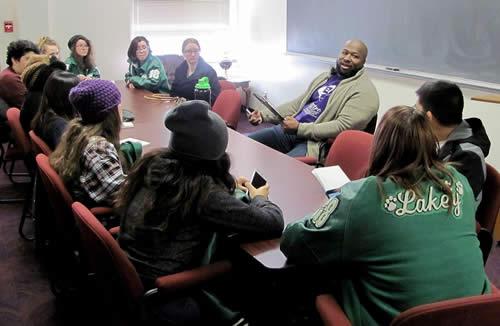
February 8, 2018 - The Stephen F. Austin State University School of Theatre hosts the 2018 UIL One-Act Play Festival Thursday and Friday, Feb. 8 and 9, in Griffith Fine Arts Building on the SFA campus.
Ten East Texas area schools are participating in the event, which includes storytelling, stage combat, lighting design, makeup and other workshops. The festival allows the high school theatre students to “practice perform” their one-act plays, which are critiqued by SFA theatre faculty, before students compete in UIL events later this semester. School of Theatre Director Cleo House Jr. offers suggestions to Central High School students following their performance of “Hansel and Gretel” Thursday morning.
The festival also serves as a recruiting tool, and students have the opportunity to audition for admission to the School of Theatre at the festival’s conclusion.
*An incorrect graduation list was previously published. Below is a corrected graduate list.
Janaury 26, 2018 Nacogdoches - The following 23 students received degrees from Stephen F. Austin State University during December commencement exercises:
Center, TX
- Brandi Sue Denby, Bachelor of Science, Human Sciences, James I. Perkins College of Education
- Carley Brooke Diverdi, Bachelor of Science in Nursing, Nursing, College of Sciences and Mathematics
- Brianna N Evans, Bachelor of Science in Interdisciplinary Studies, Interdisciplinary Studies, James I. Perkins College of Education
- Kalaceia Shuntrez Evans, Bachelor of Social Work, Social Work, College of Liberal and Applied Arts
- Bailea Blaine Foehner, Bachelor of Science, Human Sciences, James I. Perkins College of Education
- Jannie Garcia, Bachelor of Social Work, Social Work, College of Liberal and Applied Arts
- Celia Del Rosario Gonzalez, Bachelor of Science in Interdisciplinary Studies, Interdisciplinary Studies, James I. Perkins College of Education
- Brittney Joyetta Hall, Bachelor of Social Work, Social Work, College of Liberal and Applied Arts
- Darby G Hudspeth, Bachelor of Science in Interdisciplinary Studies, Interdisciplinary Studies, James I. Perkins College of Education
- Christina Joann Powell, Bachelor of Science in Interdisciplinary Studies, Interdisciplinary Studies, James I. Perkins College of Education
- Auna Clarise Shofner, Bachelor of Business Administration, General Business, Nelson Rusche College of Buiness
- Lisa Michelle Sigler, Bachelor of Science, Public Administration, College of Liberal and Applied Arts
- Lindsey Nicole Snell, Bachelor of Science in Interdisciplinary Studies, Interdisciplinary Studies, James I. Perkins College of Education
Joaquin, TX
- Hatti A Alexander, Bachelor of Science in Agriculture, Agriculture Development Production, Arthur Temple College of Forestry and Agriculture
- Ryleigh Lucretia Yates, Bachelor of Business Administration, Marketing, Nelson Rusche College of Buiness
Shelbyville, TX
- Jessica Marie Kay, Bachelor of Science in Rehabilitation, Rehabilitation Services, James I. Perkins College of Education
- Tiffanee Bree Vaughn, Bachelor of Science in Interdisciplinary Studies, Interdisciplinary Studies, James I. Perkins College of Education
Tenaha, TX
- Jennifer Nicole Roberson, Bachelor of Science in Interdisciplinary Studies, Interdisciplinary Studies, James I. Perkins College of Education
Timpson, TX
- Cade Christian Archer, Bachelor of Science, Computer Science, College of Sciences and Mathematics
- Jace Daniel Archer, Bachelor of Science, Computer Science, College of Sciences and Mathematics
- Alexandria Michelle Bryant, Master of Interdisciplinary Studies, Interdisciplinary Studies, College of Liberal and Applied Arts
- Margo Lee Hooper, Bachelor of Science in Agriculture, Agriculture Development, Arthur Temple College of Forestry and Agriculture
- Christin Kate Lindgren, Bachelor of Business Administration, Business Communications and Corporate Education, Nelson Rusche College of Buiness
February 5, 2018 - Guest artists Ching-Yi Lin and Andrew Braddock will perform music for violin and viola in a recital at 7:30 p.m. Sunday, Feb. 11, in Cole Concert Hall on the campus of Stephen F. Austin State University.
 The concert will feature primarily duets for violin and viola, as well as a solo work for violin, according to Dr. Jennifer Dalmas, professor of violin in the SFA School of Music.
The concert will feature primarily duets for violin and viola, as well as a solo work for violin, according to Dr. Jennifer Dalmas, professor of violin in the SFA School of Music.
The program includes Violin and Viola Duo No. 1 in G major by Wolfgang Amadeus Mozart; Three Caprices by Michael Alec Rose; Violin Solo, Op. 27 Ballade by Eugène Ysaÿe; and Three Madrigals by Bohuslav Martinů.
The first, second and last pieces are duets for violin and viola, Dalmas explained.
“The Mozart duet, composed in 1783, features the two instruments quite equally and is a staple in the violin-viola repertoire,” she said.
The Ysaÿe Sonata No. 3 is from a set of six sonatas that Ysaÿe wrote, each dedicated to a different great violinist of the day. This one, the “Ballade” is dedicated to the Romanian composer and violinist Enescu, who later taught Yehudi Menuhin.
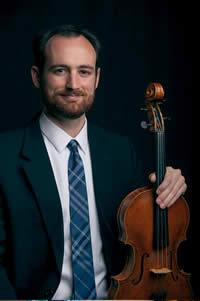 The Three Madrigals by Czech composer Martinů is one of the most well-known and frequently performed 20th century compositions for violin and viola duet.
The Three Madrigals by Czech composer Martinů is one of the most well-known and frequently performed 20th century compositions for violin and viola duet.
“Inspired in part by the Mozart duets, the piece also shows the influence of the English Madrigal, for which the composition is named,” Dalmas said.
Lin is associate professor of violin and director of the Pre-College Strings Program at Western Kentucky University. Recent performances and master classes have taken her to the Barratt Due Institute of Music in Norway, Shenyang and Xi’an Conservatories in China, Northwestern University, the University of British Columbia, and Louisiana State University. During the summer months, Lin serves on the faculty at the Indiana University (IU) Summer String Academy and WKU Summer String Institute, and she has also served on the faculty of the Sommersymfoni i Kristiansand in Norway and University of North Texas Summer String Institute in Texas.
Braddock is currently on the faculty of Western Kentucky University and its Pre-College Strings Program. He teaches viola at the university and maintains a full pre-college studio of young violinists and violists. He also serves as the director of the Summer String Institute. In addition to his many recital performances in the Kentucky area, Braddock has performed in Israel, Austria, Indiana, New York and Colorado. He is the principal violist of the Paducah Symphony Orchestra, and he has been a member of the Evansville Philharmonic and Owensboro Symphony Orchestras.
The guest artists will teach a master class, which is free and open to the public, at 2 p.m. that day in the Music Recital Hall, located in Wright Music Building.
Concert tickets are $8 for adults, $6 for seniors and $3 for students and youth. For tickets or more information, call the SFA Fine Arts Box Office at (936) 468-6407 or visit www.finearts.sfasu.edu.

February 3, 2018 - Stephen F. Austin State University is partnering with Lone Star College to offer students in the Houston area an opportunity to earn a Bachelor of Business Administration in sports business from SFA without having to relocate. The two institutions also will sign an articulation agreement to ensure a smooth transition for Lone Star College students to attend SFA.
A signing ceremony commemorating this collaboration is scheduled for 2 p.m. Feb. 15 at the Lone Star College University Center in The Woodlands. The ceremony is open to the public.
Students at Lone Star College will be able to enroll in SFA’s sports business program beginning in fall 2018. Classes will be offered face-to-face at the Lone Star College University Center in The Woodlands and will be taught by SFA faculty members. Students must complete the required core curriculum before entering the program. Business foundation courses will primarily be offered online through SFA’s Rusche College of Business.
Dr. Jason Reese, sports business program director and assistant professor at SFA, has been instrumental in establishing this program and is looking forward to the opportunities it will provide to SFA and Houston students.
“Some Houston-area students have a desire to attend SFA, but for various reasons are unable to move to Nacogdoches,” Reese said. “This program will allow them the opportunity to complete the program and earn a bachelor’s degree without relocating.”
Reese added that through this partnership, Houston students will be able to take classes while benefiting from already-established relationships that SFA has with area sports organizations, including professional sport teams like the Houston Astros, Houston Texans, Houston Rockets and Houston Dynamo.
To apply for the program, visit lonestar.edu/university-center/SFA.htm.
For more information, contact Reese at (936) 468-1465 or reesejd1@sfasu.edu.
By Kasi Dickerson, senior marketing communications specialist at Stephen F. Austin State University.
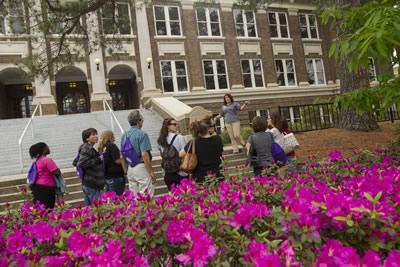 February 2, 2018 Nacogdoches — Future college students will have the opportunity to experience a taste of campus life during a free, action-packed open-house Saturday, Feb. 24, at Stephen F. Austin State University in Nacogdoches.
February 2, 2018 Nacogdoches — Future college students will have the opportunity to experience a taste of campus life during a free, action-packed open-house Saturday, Feb. 24, at Stephen F. Austin State University in Nacogdoches.
Prospective students can visit with university faculty and staff members, tour the campus and residence halls, and preview academic programs during the SFA Showcase Saturday event.
"There is no better time than Showcase Saturday to visit the beautiful SFA campus and witness firsthand what it's like to be a Lumberjack," said Jessica Maynard, assistant director of SFA's Office of Admissions.
"Guests are encouraged to visit one-on-one with our faculty members to learn more about our quality, personalized academic programs, and our staff members will be available to answer questions about everything from admission requirements to financial aid to residence life," Maynard added.
SFA is a comprehensive, residential university located in the heart of Texas Forest Country. Approximately 13,000 students attend SFA, which is within a few hours drive of Texas' major metropolitan areas.
Showcase Saturday event registration will begin at 11 a.m. on the first floor of the Baker Pattillo Student Center. Each person who registers will receive an information packet. The opening program begins at 1 p.m. and will provide an overview of the day's events.
Guests will then be able to visit with representatives from academic departments until 4 p.m. during the Academic Fair in the Student Recreation Center. A Student Services Fair will be held from 2:30 to 4:30 p.m. on the first floor of the student center.
Campus and residence hall tours will begin at 1:30 p.m. and continue until 5 p.m. Campus tours will take students on a guided walk of the SFA campus while the self-guided residence hall tours will showcase several halls on both the north and south ends of campus.
Admissions counselors will be available to discuss admission procedures and requirements from 1:30 to 5 p.m. in the Rusk Building, Room 206, and during several freshman and transfer admissions sessions held throughout the day.
Several informational breakout sessions will take place simultaneously at 2, 3, and 4 p.m., including Residence Life sessions in the student center theater on the second floor; financial aid sessions in the student center Twilight Ballroom; and freshman admissions sessions in the student center Tiered Meeting Room on the second floor.
Transfer admissions sessions will be held at 3 and 4 p.m. in the student center Multimedia Room; orientation sessions at 3 and 4 p.m. in the student center Regents’ Suite A on the second floor; and a VA/Hazlewood Act session at 3 p.m. in the student center Regents’ Suite B also on the second floor.
Participating prospective students will receive a free SFA T-shirt after completing an evaluation form in the tent located in the courtyard area of the Rusk Building.
For more information about SFA's Showcase Saturday, contact the SFA Office of Admissions at (936) 468-2504, or email admissions@sfasu.edu.
February 1, 2018 - Stephen F. Austin State University is cooking up new transformational experiences for students in the School of Human Sciences.
At its quarterly meeting, the SFA Board of Regents approved the purchase of a mobile food lab — a gourmet food truck — that will be utilized on campus and at recruiting events such as career and college fairs.
“This mobile lab will be the first of its kind in Texas, and there are only a few nationally that are utilized as an academic laboratory,” said Dr. Lynda Martin, director of SFA’s School of Human Sciences. “We are excited to offer students this unique avenue for learning.”
The food truck trend began in Los Angeles and has become popular across the nation. According to its website, research by the National Restaurant Association shows that the food truck trend will continue to accelerate as entrepreneurs use them to enter the restaurant industry.
SFA’s mobile food lab will allow students to experience active learning in a realistic setting as well as engage and empower students to create and execute an entrepreneurial business plan.
“This type of transformational practice makes a difference in students’ lives,” Martin said. “Students working the mobile food lab will gain experience with running alternative venues, meal planning, menu creation, budgeting and more.”
The university plans to have the mobile food lab purchased and operational by January 2019.
For the second year in a row, regents avoided increasing designated tuition. Course and lab fees, which provide funds to support the actual cost of consumable supplies, service and travel related to specific courses, were adjusted to accurately reflect the costs of course delivery for 2018-19.
To simplify billing and budgeting, four mandatory fees were consolidated into a university services fee. The academic advising, library, publication and technology fees, which previously totaled $49 per semester credit hour, have been eliminated. The new university services fee was set at $73 per semester credit hour.
The student services fee, which covers a variety of services including the SFA Health Clinic, increased by $1 to $13.50 per semester credit hour for fiscal year 2019.
Room rates will increase by 2 percent effective fall 2018. Regents also approved a 1.9 percent increase in board rates. Almost half of the residence halls on campus have room rates less than $2,000 per semester for 2018-19.
The board approved renovations to the third and fourth floors of the McGee Business Building to further transform the building for the Rusche College of Business. Updates will include lobby spaces, common areas, classrooms and an innovation hub.
Regents heard reports from three design firms before selecting the Gensler firm to assess and develop programming for SFA’s athletic facilities. Gensler will evaluate existing campus athletic facilities to give direction and recommendations for improving these facilities. Designated funds will be used to fund the architectural assessment.
The largest design firm in the world, Gensler has more than 3,500 clients and has been named No. 1 on Building Design’s Top 100 list for the third year in a row. Gensler's work history includes more than 120 sports projects worldwide, including Texas Christian University, Texas Tech University, and The Star in Frisco, home of the Dallas Cowboys.
The board authorized an agreement with Under Armour as the exclusive sponsor to supply apparel to SFA’s athletic program. This agreement will provide SFA with Under Armour shoes, uniforms, equipment and accessory products valued at $125,000 in the first two years and at $135,000 in years three through five. Additionally, Under Armour will pay the university performance bonuses based on the achievements of athletic teams in each contract year, and the team dealer will provide additional products valued at $10,000 each year.
SFA also will work with Paciolan — a Learfield company that is a leader in ticketing, fundraising, marketing analytics and technology solutions — to update the athletic ticketing system to a digital format. According to Robert Hill, director of athletics, the system will allow patrons to renew season passes and purchase tickets via their mobile devices. Fans will be able to present electronic tickets via mobile devices for admission to sporting events.
“In addition to increasing overall net ticket revenue, this system can be coordinated with our social media efforts and has the potential to enhance the fan experience, increase alumni and community engagement, and assist with fundraising campaigns,” Hill said.
The university will no longer print a curriculum catalog, but will work with Digarc to create a more efficient and user-friendly way of managing SFA’s course curriculum and catalog. By utilizing Digarc’s Acalog and Curriculog software, the university will offer up-to-date course information digitally. The software solution will provide a secure online process that syncs with Banner, the university’s current course information system.
The Department of Agriculture plans to build an additional livestock facility at the Walter C. Todd Agricultural Research Center. To provide electricity to the facility, regents approved an easement agreement, or temporary access, with the Deep East Texas Electric Cooperative. Regents also signed off on a similar agreement with Oncor Electric to relocate an electric pole on SFA property as the Texas Department of Transportation widens East Austin Street.
During the Tuesday meeting, the board also approved:
• a four-year agreement with Oracle for purchase of the Oracle Exadata “Cloud at Customer” system with offsite backup;
• a contract with Oracle for a budget and financial forecasting system;
• changing the food, nutrition and dietetics degree to dietetics and nutritional sciences to better reflect the two focus areas of the degree;
• resolutions to acknowledge review of investment policy and strategy and approve qualified financial institutions and investment brokers;
• ratifying $325,698 in additional grant awards allocable to fiscal year 2018;
• the release of rights for a potential invention to Dr. Matibur Zamadar, SFA assistant professor of chemistry;
• the SFA Charter School audited financial statements for 2016-17; and
• the 2016-17 annual financial report and acknowledged the receipt of audit services report.
Regents elected board officers for 2018-19: Brigettee Henderson, chair; Alton Frailey, vice chair; and Nelda Blair, secretary.
The board approved policy revisions and minutes from the October meetings. Regents received updates on the statutory contract (Senate Bill 20), the university’s marketing campaign and current construction.
Regents heard reports from Texas A&M University System Investments; Dr. Tim Bisping, dean of the Rusche College of Business; Dr. Judy Abbott, dean of the James I. Perkins College of Education; the Faculty Senate; Student Government Association and the university president.








